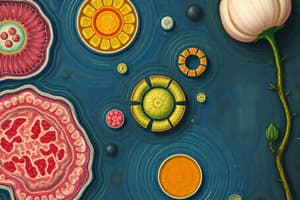Podcast
Questions and Answers
Which of the following correctly describes the stages of mitosis?
Which of the following correctly describes the stages of mitosis?
- CELL
- PMAT (correct)
- APPEARANCE, METAPHASE, ANAPHASE
- G1, S, G2, M
Eukaryotic cells lack a nucleus.
Eukaryotic cells lack a nucleus.
False (B)
What disease is associated with the respiratory system and affects lung health?
What disease is associated with the respiratory system and affects lung health?
Tuberculosis
The equation for photosynthesis is _____ + carbon dioxide + water → glucose + oxygen.
The equation for photosynthesis is _____ + carbon dioxide + water → glucose + oxygen.
Match the organ systems with their primary disease:
Match the organ systems with their primary disease:
Flashcards
Cell Types: Prokaryotic vs. Eukaryotic
Cell Types: Prokaryotic vs. Eukaryotic
Prokaryotic cells lack a nucleus and other membrane-bound organelles, while eukaryotic cells have a nucleus and other membrane-bound organelles.
Tissue Types
Tissue Types
There are four main types of tissue: epithelial, muscular, connective, and nervous. Each tissue has a specific structure and function.
What happens in Mitosis?
What happens in Mitosis?
Mitosis is a type of cell division that results in two identical daughter cells, each with the same number of chromosomes as the parent cell.
What is a Stem Cell?
What is a Stem Cell?
Signup and view all the flashcards
What is the Respiratory System's Main Function?
What is the Respiratory System's Main Function?
Signup and view all the flashcards
Study Notes
Cell Biology
- Cellular Organization: Biology explores hierarchical organization from atoms to the biosphere. Cells are fundamental units.
- Tissue Types: Four primary tissue types exist: epithelial (covering), muscular (movement), connective (support), and nervous (communication).
Prokaryotic vs. Eukaryotic Cells
- Prokaryotic vs. Eukaryotic: Prokaryotic cells lack a nucleus and membrane-bound organelles. Eukaryotic cells possess both.
- Plant vs. Animal Cells: Plant cells have cell walls, chloroplasts, and a large central vacuole; animal cells lack these structures.
Cell Cycle and Division
- Cell Cycle Phases: The cell cycle has distinct phases: interphase (growth and DNA replication), mitosis (nuclear division), and cytokinesis (cytoplasmic division).
- Mitosis Stages: Mitosis follows a specific sequence (PMAT): Prophase, Metaphase, Anaphase, Telophase.
Stem Cells and Cancer
- Stem Cells: Undifferentiated cells capable of differentiating into specialized cell types. Found in embryonic tissues, umbilical cord blood, and adult tissues.
- Cancer Cells: Uncontrolled cell division, originating from various body tissues. Characterized by uncontrolled growth.
Organ Systems
- Respiratory System: Involved in gas exchange.
- Organs: Mouth/nose, pharynx, trachea, bronchi, bronchioles, lungs.
- Disease: Tuberculosis.
- Digestive System: Breaks down food.
- Organs: Mouth, esophagus, stomach, intestines, liver, gallbladder, pancreas.
- Disease: Celiac disease.
- Circulatory System: Transports nutrients and oxygen.
- Organs: Blood, heart, blood vessels.
- Disease: Coronary heart disease.
Plant Tissues & Processes
- Plant Anatomy: A typical flowering plant and a leaf cross-section illustrate diverse plant tissue structures.
- Plant Tissues:
- Dermal: Outer protective layer.
- Vascular: Conducts water and nutrients (xylem and phloem).
- Ground: Supports and stores.
- Meristematic: Actively dividing cells for growth.
- Plant Systems: Root systems anchor; shoot systems support above-ground growth.
- Xylem and Phloem: Xylem transports water and minerals; phloem transports sugars.
- Photosynthesis: Plants utilize light energy, carbon dioxide, and water to produce glucose and oxygen.
- Diffusion and Osmosis: Passive transport mechanisms vital for plant function, explained in detail in the text.
Studying That Suits You
Use AI to generate personalized quizzes and flashcards to suit your learning preferences.



